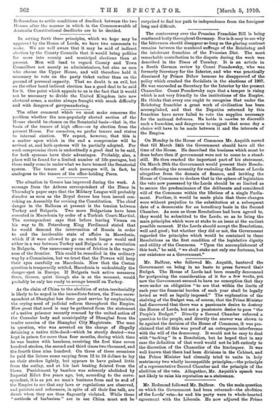On Monday in the House of Commons Mr. Asquith moved
that till March 24th the Government should have all the time of the House. He described the business which must be done before then if government were not to come to a stand- still. He then reached the important part of his statement. On March 29th the Government would present their Resolu- tions affirming the necessity for excluding the House of Lords altogether from the domain of finance, and inviting the House of Commons to declare that in the sphere of legislation the veto now possessed by the Lords should be so limited as to secure the predominance of the deliberate and considered will of the Commons within the lifetime of a single Parlia- ment. Further, it would be made plain that these changes were without prejudice to the substitution at a subsequent date of a democratic for an hereditary basis in the Second Chamber. As soon as these Resolutions had been agreed to, they would be submitted to the Lords, so as to bring the main principles which were at stake to an issue at the earliest possible moment. If the Lords should accept the Resolutions, well and good ; but whether they did or not, the Government regarded the principles which would be contained in these Resolutions as the first condition of the legislative dignity and utility of the Commons. "Upon the accomplishment of this task," he said, " we shall stake not only our fortunes, but our existence as a Government."














































 Previous page
Previous page